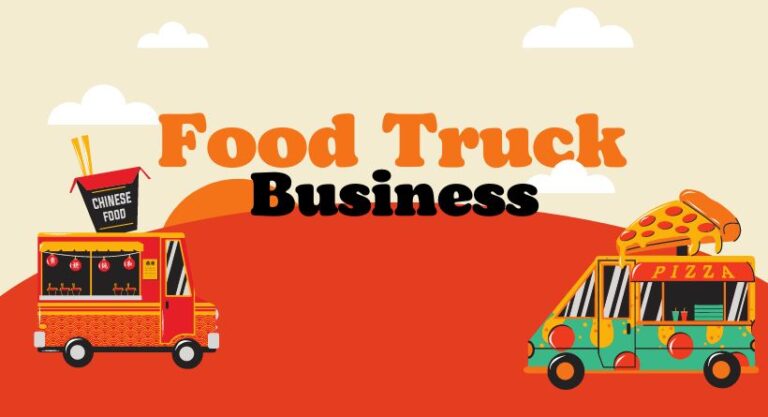The food truck business can be rewarding. If you’ve ever thought about making good meals on the go, this guide on launching a food truck business is for you.
Even though they might not have the funds, food enthusiasts with an entrepreneurial itch could be able to establish a food truck business instead of a traditional brick-and-mortar restaurant.
A huge vehicle with a kitchen to prepare and serve meals is called a food truck. They are spreading like wildfire across the country and are rising in popularity. Since acquiring a restaurant space is quite expensive, many business owners choose to operate a food truck instead.
Here is the information you need to know before moving forward, including the initial expenses, funding alternatives, where to find food trucks, and more.
Starting expenses for food trucks
The initial launch expenses for a food truck company depend on a variety of things. Additionally, there are expenses that are one-time and location-specific.
A food truck’s purchase, a point-of-sale (POS) system, a truck wrap, a website design, office supplies, advertising and public relations, as well as any professional, legal, or consulting fees, are examples of one-time startup expenditures. This list, while not exhaustive, provides prospective food truck entrepreneurs with an idea of some of the initial costs.
According to Rachel Angulo, owner of the La Cocinita food truck, “We paid just $15,000 for the food truck itself, but we didn’t realize that we’d spent more than double that to have it modified to fit the local fire and health regulations, which vary quite significantly depending on the municipality.
Then there are the ongoing expenses, which include fuel, wages, equipment leasing, and credit card processing. Every new food truck enterprise must also get the necessary permissions and licenses, which change based on the area.
Depending on your particular circumstances, the price to launch a food truck business might range from $28,000 to $114,000 in order to get the enterprise off the ground.
You should anticipate the following additional initial expenditures when starting a food truck business, according to Food Truck Empire:
Cost of insurance: $2,000 to $4,000 annually
Initial stock of the product: $1,000 to $2,000
Processing of payments: $200 to $1,000
Fees for commissariat: $400 to $1,200
Licenses and permits: $100 to $500
Finance possibilities for food trucks
The hardest obstacle to launching a food truck company may be finding money.
Create a strong business strategy as your first priority. Additionally, you’ll have a better chance of getting a company loan if you have both outstanding personal and business credit.
Obtaining finance for your new food truck business can be done in other, more inventive methods as well.
Here are some strategies for launching a company on a shoestring budget:
- Discuss a lease or leasing arrangement with someone who currently runs a food truck.
- Start with a secondhand cart or trailer that is inexpensive.
- Start selling at a pop-up shop, farmer’s market, or fair booth.
- Discuss operating a food truck for the owner’s company with successful restaurant owners.
- Seek for sponsors if your truck concept involves offering a public service or benefit to the neighborhood.
- If you currently use a payment processor, you could be eligible for a loan advance.
Plan the business of a food truck.
A business plan should be written and updated by every owner of a food truck. When you decide that you want to launch a food truck business, this should really be the first action you do. This paper will help you draw in investors, secure finance, and launch your firm.
The following components of your business strategy should be present, according to WebstaurantStore:
- a summary, executive. An executive summary serves as an overview of your firm and serves as an introduction to it. Since the specifics of the strategy will be covered in other parts, the executive summary should be brief.
- corporate profile. It should be clear in this area who you are and what makes your business unique. Describe the niche you are filling and the benefits your clients will receive from choosing you over your rivals.
- study of the market. You describe your target audience in this part, along with their demands, location, and strategies for luring them to your company. This part also has to show your familiarity with the current local food industry and how your company will affect the current market.
- Arrangement and management. Then, describe in full how your company is set up as a legitimate business organization (e.g., sole proprietor, LLC, partnership). List the company’s owners along with their stakes in the business. Along with their qualifications, compensation, and previous jobs, significant individuals like your management team should be listed.
- product or service offering. The food you serve is the main item you sell while operating a food truck. Describe your menu and your marketing strategy in this area. Consider how your company will develop and meet new market demands as well.
- sales and advertising. Your marketing strategy should be elaborated out in this area. Describe your marketing strategy, list all of the marketing channels you’ll be using (such as social media, a website, paid commercials, etc.), and explain how you’ll beat out your rivals. Along with your sales plan, this area must also include information about your menu prices, minimum sales needed to continue in business, and seasonal trends that might impact sales.
- Demand for funding. Entrepreneurs operating food trucks who are looking for outside investment capital or other forms of finance must complete this section. Indicate the amount of money you require and elaborate on how each dollar will be used to expand your company.
- financial estimates. Estimate how much money your company will generate over the next three to five years, even though it might be challenging to provide specific financial estimates, especially for startups without a history of profitability.
- Although an appendix is not always required, it is a nice location to incorporate any additional information you feel is crucial to share with lenders or investors. This might range from producing pictures to letters of recommendation.
How to locate for sale food trucks
Despite the fact that Craigslist is still a wonderful place to start your search, there are a lot of new tools available, such as:
- Local internet classifieds: This is an excellent alternative because old trucks are less expensive and can be easily inspected if they are local.
- National internet classifieds: This can expand the inventory significantly, but because you’re probably not going to see the truck in person before pickup, make sure you gather as much information as you can from the vendor.
- New custom trucks: Although this is the priciest choice, it is the greatest way to guarantee that your vehicle complies with regulations and standards and may be personalized to your preferences.
- Leasing and franchising: You might be able to lease a truck locally or from a large truck leasing company. Leasing and franchising Franchise a vehicle from an established business is still another choice. The fact that you have no control over the goods, promotion, or menu is one of the disadvantages to take into account.
Options for mobile POS
Although most consumers of food trucks prefer to pay with cash, credit cards and mobile payments are also often used.
We’ve always utilized Square, and we’re satisfied with both their POS service and credit card processing, according to Angulo.
The following alternatives for processing sales are listed from the least expensive to the most sophisticated.
Cash only sales and the cash box
- Advantage: Reasonably priced. For less than $20, you may acquire a lockable box.
- Disadvantage: Does not keep track of sales or food inventories. You are unable to accept card payments.
- ongoing expenses: None
Cash box including a mobile card reader
- Benefits: Reasonably priced. Mobile processors can simply charge swipe fees, but in order to connect to the processing service, you’ll need Wi-Fi connection and/or a strong data plan.
- Disadvantages: The majority of mobile processors come with a basic inventory system and few extra functionalities.
- ongoing expenses: Processing costs for credit cards, debit cards, and mobile data
Cash box plus POS device plus mobile processing
- Advantages: Mobile sales and inventory tracking, as well as credit and debit card processing
- Disadvantages: A supplementary monthly service charge and hardware expenses
- Ongoing expenses: include a monthly fee for the POS service, card processing fees, mobile data fees, and maybe hardware costs.
The benefits of operating a food truck business
- Having a business: Even though owning and operating a business is challenging, there are several tax benefits, so at least there is some respite on that front.
- Freedom: You have a lot of freedom as a food truck business owner, including the ability to select your staff, vendors to buy from, events to sell at, and menu choices. Additionally, you are totally in charge of your scheduling, marketing, and social media.
- Mobility: A major benefit, according to Angulo, is being able to move your business to other areas based on demand at various times of the day, days of the week, etc.
The difficulties faced by food truck businesses
- Time: A food truck company involves working long hours frequently. Running such a business requires more than a full-time work due to the need for shopping, preparation, marketing, event planning, cleaning, truck maintenance, bookkeeping, and tax duties, etc.
- Market and rivalry: Do thorough market research to improve your chances of success; there will undoubtedly be competition from other food trucks.
- Regulations and zoning: Where you can park your food truck and how long you can stay there vary depending on the neighborhood. To avoid penalties and fines, make sure you are aware of the regulations in any site where you intend to conduct business.
Permits and regulations for food trucks
It is crucial to examine the various locations you are thinking about for your company’s location and take into account any relevant permits and laws.
The following are a few key things to watch out for:
- Food Safety: Like any other restaurant in the area, you must abide by the regional standards for food safety. To learn more, including if you can use your own facilities or whether you must prepare all of your meals in a commercial kitchen, get in touch with the local health department. Small Business Guide to POS: Point of Sale Systems and Software is a Related Article.
- A seller’s permit, which enables you to buy food and equipment at wholesale costs without paying sales tax, is something that certain jurisdictions require food truck proprietors to apply for.
- Zoning and Parking: Research parking and zoning regulations before opening your business as there may be limitations on where you can park your vehicle. There can be zoning restrictions that differentiate between commercial and noncommercial uses, parking time restrictions, or proximity restrictions to neighboring businesses. You can get assistance from the local and city motor vehicle departments.
- Vehicle license: Because your business relies on a vehicle for transportation, each driver must possess the necessary documentation and training. To legally drive the food truck, you might need a commercial driver’s license, depending on your state and the size of your car.
- Fire certificates: You’ll probably need to go through a fire department inspection if you’re utilizing the truck’s equipment to cook food. State every state differs in their requirements for a fire certificate.
- Employer Identification Number (EIN): If you intend to employ people, you must apply for an EIN, which is a federal tax ID given out by the IRS to identify a business entity. You can create a business bank account and begin building your company’s credit history with an EIN as well.
- Business permits and licenses: As with any business, operating a food truck requires a number of licenses, including a DBA and a state sales tax permit, both of which are inexpensive and simple to get. Check the rules in your home state before forming your firm. Try an online service like Legal Zoom for a simple solution. Read our article on How to Choose the Appropriate Legal Structure for Your Business for assistance in determining which legal structure is best for your company.







